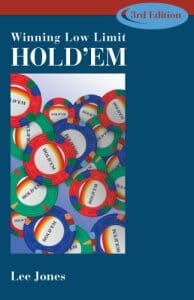The Best Book to Read If You Want to Win at Small Stakes Limit Texas Hold’em Poker
by Steve Beauregard

You know what’s great about poker? Unlike every other game in the casino, you can actually be a winner and make money in the long run at the game.
But this is true only if you have both self-disciple and a firm understanding of game strategy.
The nice thing for those of us who play at lower limits ($2/$4 limit, $3/6, $4/8 and the ubiquitous $1 / 2 No-limit), is that fancy, advanced techniques aren’t needed to succeed against the poor-playing table mates at the average low limit table – players who are either ignorant of poker fundamentals, or who simply don’t follow them.
While poker is a incredibly complicated game, with the countless decisions and consequences to consider, you only really need two qualities to win at low limit poker:
1) Basic card knowledge
2) Self-discipline
I can’t help you with the self-discipline part, but I can point you towards a great, easy-to-read source of poker knowledge. Keep in mind that I’m talking about learning how to beat the lowest buy-in games in the poker room. These aren’t tips on when to try to three-bet Ivey off a pot on 4th street.
Winning Low-Limit Texas Hold’em Poker
Remember the cutesy posters from a few years ago? It was titled “All I really need to know I learned in Kindergarten.”
That’s bull of course. I have a kindergartner. She needs to learn a lot more, starting with how not to bother Daddy while the Broncos are facing third and long with under two minutes remaining. But I digress.
In low limit poker, you could say, “All I really need to know I learned from Lee Jones’ book, ‘Winning Low-Limit Hold’em.’”
If you plan on playing a lot of small stakes limit hold’em, (Lee covers only limit hold’em as opposed to no-limit poker), you must purchase this book.
Poker has unlimited possibilities and factors that go into every decision. In his book, Lee Jones guides you with a simple plan on how to navigate the myriad of decisions you’ll face at the poker table.
There are plenty of other books out there that dive into the detailed scenarios and strategies, however Lee’s short, easy-to-digest book is for the rest of us who want to arrive at the poker table prepared, and armed with a solid foundation of poker knowledge.
The book covers everything from poker etiquette to the recommended starting hands you should play, to primers on more advanced strategies.
It’s written in a straightforward style and its information is targeted at those of us playing in the low limits. While fancy play and bluffs make for good televised poker, Lee argues that simple, basic play, in which you follow his standard guideline for starting hands, is the key to beating your fellow amateurs at the table.
Jones’ book will teach you when and where to fold those pocket eights pre-flop, and how to know when to let go post-flop.
One of the best pieces of advice I took from the book is to not slow play your big hands. While tempting to slow play that flopped set, low limit poker’s fixed bets sometimes (OK, ALL the time), encourages weaker players to stick around with impossible to hit draws.
Playing your strong hands aggressively won’t always prevent a fish from sucking out on you, and giving you a bad beat, however it will make sure your poker play is profitable in the long-term.
To win at low limit hold’em poker, you must buy this book. (You can find used copies on Ebay for five bucks – money well spent). Don’t check it out at the library. Don’t borrow it from a buddy. Buy it. Then after you read it, read it again. Then again a week later, then a month after that too. But don’t just read it, take the quizzes, and think about what you’ve read. Absorb the book, and memorize the starting hands he recommends for each position at the table.
If everybody followed this book’s advice, you would have zero advantage at the table. Fortunately, most of the folks at your table haven’t read it. Or perhaps they have read it, but they simply haven’t followed its advice. Either way, you win.
